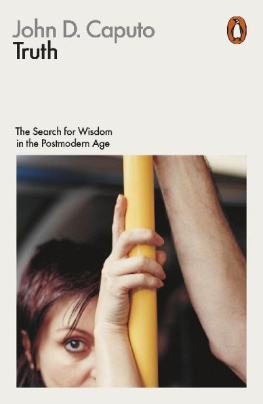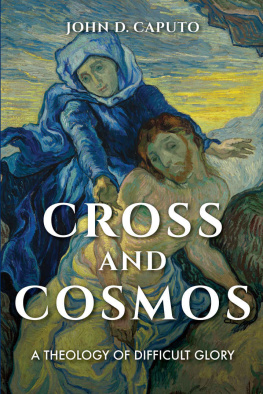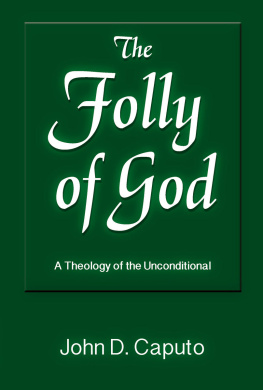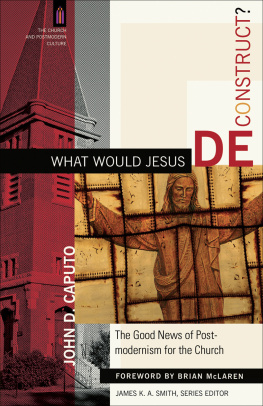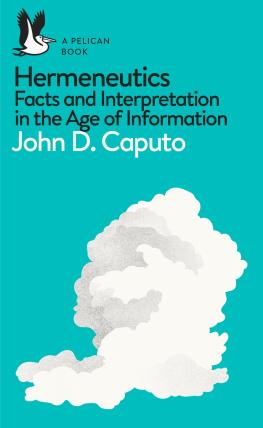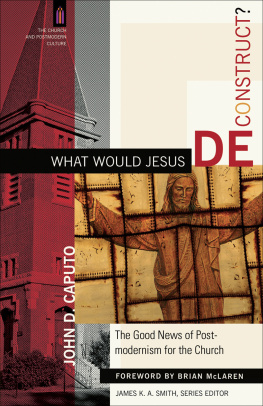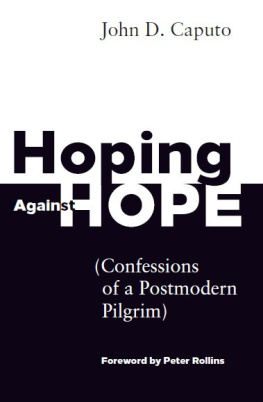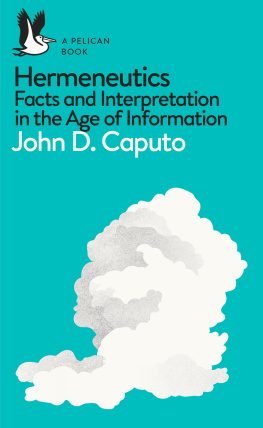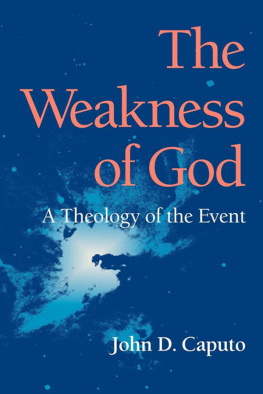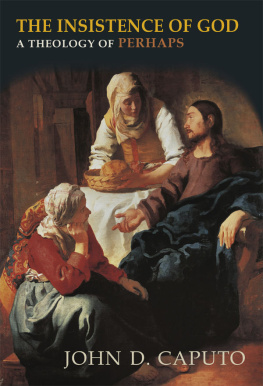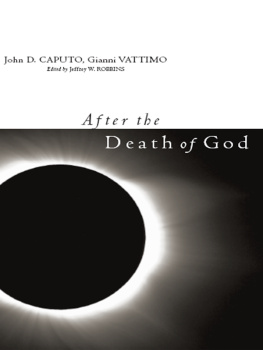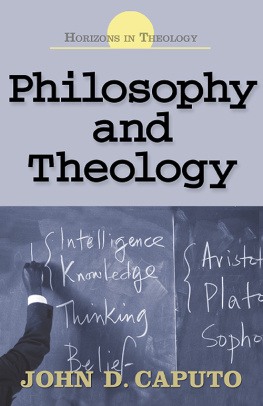John D. Caputo
TRUTH
The Search for Wisdom in the Postmodern Age
Contents
PENGUIN BOOKS
TRUTH
John D. Caputo is a specialist in contemporary hermeneutics and deconstruction with a special interest in religion in the postmodern condition. The Thomas J. Watson Professor of Religion Emeritus at Syracuse University and the David R. Cook Professor of Philosophy Emeritus at Villanova University, he has spearheaded an idea he calls weak theology.
Introduction
Truth on the Go
Riding to work in the morning has become pretty pedestrian. Well, not exactly pedestrian, because pedestrians are walkers and we dont walk. But it has become commonplace. We ride everywhere. Doctors and public health officials plead with us to get out and walk, to get some exercise because of our increasingly sedentary lives. Sedentary, on the other hand, does not mean we stay in one place. On the contrary, sedentary means that even when were not sitting in front of a computer, even when were on the go were still seated in cars, trains, planes and with our laptops in tow. People used to live within walking distance of the fields in which they worked, or they worked in shops attached to their homes. Now we ride to work, and nearly everywhere else, and were always on the go. Which may seem an innocent enough point, and certainly not one on which we require instruction from the philosophers. But, truth be told, it has in fact precipitated a crisis in our understanding of truth.
In the past the philosophers, like everyone else, tended to stay close to home. In the eighteenth century, Immanuel Kant (one of the names on everybodys short list of great philosophers) was famous for having never left Knigsberg. That made life simpler for him and gave him the idea that the way things were done in Knigsberg was the way they were, or ought to be, done everywhere, and that where there were differences, the differences were variations on what male German philosophers thought was true. Kant read the travel literature of the day, journals kept by ships captains, but he never saw the inside of a ship. He was also a leader of the Enlightenment, which emphasized the Universal standards of Pure Reason. But the problem for Kant was that universal had a way of collapsing into European, while pure tended to mean never having met anyone else.
Nowadays we dont need to live within walking distance of where we work, and we can go almost anywhere we want if we have the money for the trip. We can fly like birds and visit other countries, cross oceans, not to mention the extraordinary amount of travelling we do through the media and the internet which bring other people and other places to us even when we stay home. We can be almost anywhere at any time, and the faster the trip, the better. The Instant Message has become the ideal: getting where you want to go in the blink of an eye and at the speed of thought itself. Thats actually how the angels travel in heaven, or so were told by those who claim to know such things. The angels, we read in the Bible, ran a kind of instant messaging service for God in the days before the Most High could have used email or a smartphone. Instant messaging, instant travel, instant meals where will it end? And where are we going, anyway? Does anybody know the name of the last stop, or the one right before the last one so we can have some warning? Does anybody even know how to get off the train?
None of this may seem to have anything to do with truth, but in truth, this non-stop travel has created a crisis in our most treasured verities. Contemporary life, which is marked by modern transportation systems in which we can travel almost anywhere, and modern information systems, through which almost anything can travel to us, is much more pluralistic than life in the past. We are more exposed to others and others to us. We have a robust sense that life is not confined to Knigsberg or Kansas and that the world is a very diverse and pluriform place. This has resulted in ideas about open-ended rainbow cultures rather than monochromic pure ones. But it has also created trouble. On the one hand it has created social strife, arising from an influx of peoples into the wealthier nations in search of a better life, as well as the exploitation of the poorer countries by the wealthier ones on the global market. Kant, to his credit, saw some of this coming, and addressed it under the name of cosmopolitanism, treating visitors as citizens of the cosmos, of the world, which is an excellent point, especially coming from someone who didnt get around much. On the other hand, contemporary life has created problems for philosophers, as all this pluralism threatens a veritable vertigo when it comes to truth, and that vertigo is called postmodernism .
Postmodern culture is the globalized, multicultural, high-tech world in which we live. We can travel almost anywhere, see just about anything on television or a laptop, and see and talk to people on the other side of the world without leaving our seat and if it started in the western industrialized countries, it is gradually spreading around the globe today. This induces a rather different frame of mind than if we had spent our entire life in Knigsberg (or Kansas). Given the unremitting exposure of life in a high-tech world to the tremendous variety of cultures and lifestyles which contemporary travellers see and visit, or which visit them, they have developed a heightened sense of difference. Difference is a buzz word for postmodernity just the way universal was for modernity , a word that I will use throughout to signify the Enlightenment, the age of Reason that first emerged in Europe in the seventeenth and eighteenth centuries and which subsequently shaped the contemporary world of science, technology and civil liberties. Universal is a modern motif, difference is a postmodern one. Modernists tended to think the whole was a system unified by a central power (God, if you still went to church, nature, if you didnt) where all the clocks and trains ran on time. Postmodernists tend to think things hang together laterally, linked up like a web, say, a world wide web, where it makes no sense to speak of who is in control or even of where it begins or ends. How do you get to the end of the www? Modernists prefer the abstract lines of Google Map; postmodernists prefer the loosey-goosey terrains of Google Earth. Modernists think things are rule-bound and mathematical; postmodernists appreciate the irregular and chaosmic, to borrow a felicitous neologism from James Joyce, meaning a judicious mix of chaos and cosmos. The postmodern ideal would be chaosmopolitanism. This postmodern effect even showed up in physics, when the paradoxes of Relativity and Quantum Theory replaced the regularities of Newtonianism, and in mathematics, when Kurt Gdel unnerved classical mathematicians with his undecidability theorems in 1931.
What then, in brief, is the postmodern, not as a culture, but as a mode of thought? To begin with, the post does not mean anything anti-modern or reactionary against the advances made in modernity, nor some attempt (always futile and nostalgic) to take flight to the premodern. The best way to think of postmodern thought is as a style , rather than as a body of doctrines; it is an inflection or alteration that continues the project of modernity, but by other means. Where modernity thinks there are pure rules and a rigorous method in ethics as well as in science postmodernity advises flexibility and adaptability. Where modernity thinks that things divide into rigorously separate categories, like reason and emotion, postmodernity thinks that these borders are porous, and that each side bleeds into the other. Where modernists look for the one big story that covers all phenomena like all of human history postmodernists express what Jean-Franois Lyotard (192498) called incredulity toward meta-narratives, which became the most familiar definition of postmodernism. This means a refusal to be taken in by big, overarching accounts, as if there was only one really big story to tell about human behaviour (sex, power, God, etc.). Where modernity favours the universal, postmodernists savour the singular and idiosyncratic. Modernists do not welcome exceptions to their rules; postmodernists think that the exception is the engine of creativity and the occasion on which the system can reinvent itself. Where modernists seek certitude, postmodernists see the salutary effects of a healthy scepticism. If we take the particular example of language, which is one of the places in which the postmodern critique of modernism broke out, the structuralists (modernists) put their heart into designing a deep grammar of the universal laws governing any possible language while phenomena like metaphors and metonymies, which stretch and bend the rules in unexpected and non-programmable ways, stole the heart of the poststructuralists (postmodernists).



